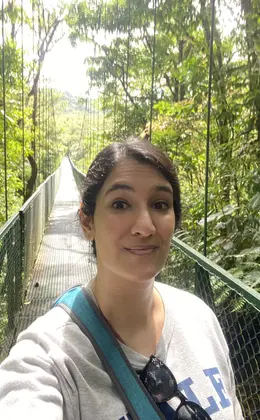
Sustainable Development: Lessons from Costa Rica
Roshni Walia ’23 shares insights from Global Network Week at INCAE Business School.
In March, three other SOMers and I attended a Global Network Week (GNW) program on sustainable development at the INCAE Business School in Costa Rica. We joined 11 other students from different business schools for an immersive week of learning, spending our time grounding ourselves in the theories of sustainable development and seeing how they have played out practically through company visits and hearing from those involved in business in Costa Rica.
Costa Rica is a beautiful and tiny Central American country that’s a rising ecotourism hub. The country has made great strides in development and improving wellbeing for its citizens over the past few years. Three of us started the week off with some requisite tourism, visiting the beautiful area of Monteverde to take in some nature through various hanging bridges and going zip lining. Coupled with serene surroundings and amazing, fresh food, this was a great way to set the tone for the week.



As a Kenyan attending business school at Yale, I’m very interested in sustainable development and social impact and wanted to learn more that I could apply back in my home country. The GNW program provided me with an opportunity to expand my understanding of how the business and society mission could play out in different contexts.
During the week, we started by grounding ourselves in the context that Costa Rica operates in and has grown from, focusing on why it’s essential to consider economic, social, and environmental impacts in the context of sustainable development. (Fun fact: The first professor we had, Lawrence Pratt, is an SOM alumnus!) We explored the impact and importance of tourism on development, as well as potential downsides of this industry. We also spent time thinking about the difference in perspectives on growth from developed versus developing countries. As someone from Kenya, which is firmly in the latter category, I found this incredibly helpful.
In class, we discussed various case studies of businesses in Costa Rica that have focused on sustainability in various areas, like Ecofiltro, and supplemented this with two visits. Our first visit was to Florex, a company that focuses on sustainability in making cleaning products. We had lunch at a restaurant on an organic farm owned by the family who owns Florex and learned about organic coffee production. Our second visit was to Doka, a coffee farm that’s also a Nespresso supplier.



In class, we practiced making decisions that would have real-world implications, such as negotiating between a buyer and an indigenous community and using a simulation to manage a fictional country while considering both GDP and social factors. These experiences challenged us to think critically and make decisions based on a broader perspective, beyond just financial gain. One highlight for me was learning about the Social Progress Index, a data-driven tool that measures complex challenges in society, including basic human needs, wellbeing, and opportunity. This index emphasizes the importance of looking beyond GDP as the sole indicator of a country’s wellbeing.
Throughout the week, we also learned that sustainability and profitability can go hand in hand. We discovered how businesses can make a positive impact while still generating profits, and how sustainability is a complex and interconnected issue that requires careful consideration of all factors involved.



But the experience was not just about learning in the classroom: It was also about building relationships and understanding different perspectives. I had the opportunity to interact with peers from other business schools, who brought unique perspectives and enriched the learning experience. We spent an intense week together, forming new bonds across countries and cultures.
I would highly recommend this program to future SOMers. It aligns perfectly with Yale SOM’s mission and provides a diverse and valuable perspective. The faculty were amazing and incredibly knowledgeable. It was great to interact with peers from other business schools who enriched our learning with their perspectives. My experience at INCAE reinforced my passion for social impact and sustainable development in East Africa, but also expanded my definition of what those concepts mean.
Overall, my time at INCAE was amazing. I left with a renewed sense of purpose and a deeper understanding of the intersection between sustainability and business.



